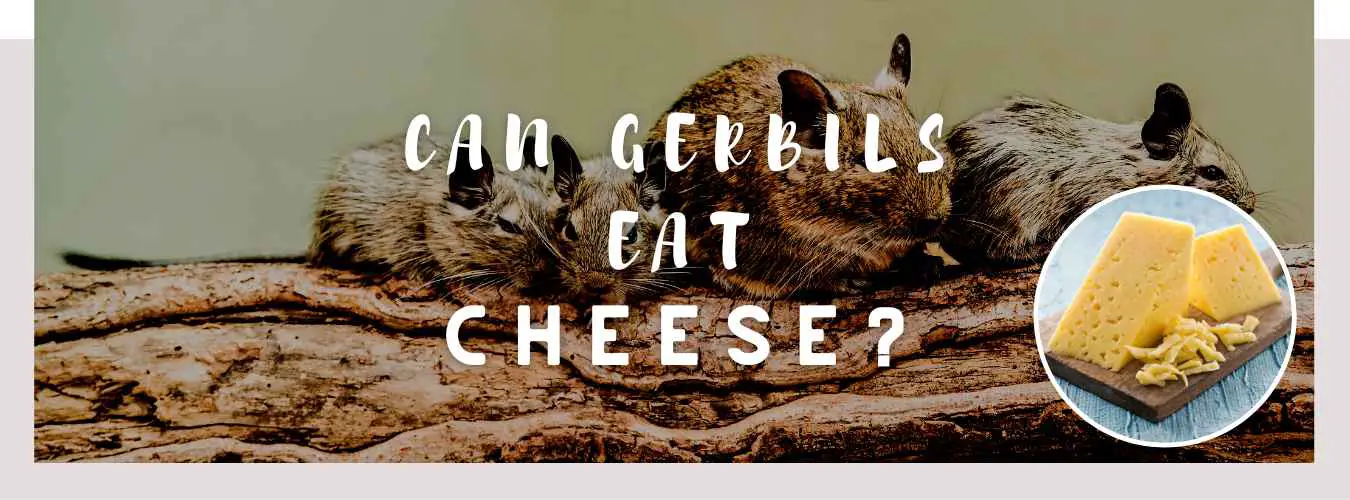
Cheese, a staple in many human diets, often piques the curiosity of pet owners who wonder about its suitability for their furry companions. Specifically, when it comes to gerbils, the question arises: “Can gerbils eat cheese?” This article aims to explore this topic, offering insights into the compatibility of cheese with a gerbil’s diet.
Gerbils are omnivorous creatures, meaning their diet encompasses both plant and animal-based foods. In the wild, their diet consists mainly of seeds, grains, and insects. This natural diet is low in fat and high in fiber, shaping the framework for what is considered healthy for them.
Is Cheese a Good Fit for Gerbils?
Cheese, by its very nature, is rich in proteins and fats. While protein is a crucial component of a gerbil’s diet, the high-fat content in cheese is where the concerns arise. Gerbils’ digestive systems are not designed to handle high-fat foods well, which can lead to obesity and other health issues if such foods are consumed regularly.
Cheese offers a range of nutrients, including calcium, essential for strong bones and teeth, and proteins, necessary for muscle and tissue repair. However, the fat content, particularly in richer cheeses, may pose a risk to the health of a gerbil if ingested in significant quantities.
Potential Risks of Feeding Cheese to Gerbils
One of the primary risks associated with feeding cheese to gerbils is its high-fat content. Gerbils are prone to obesity, and a diet high in fat can exacerbate this risk. Additionally, some gerbils may be lactose intolerant, and consuming cheese could lead to digestive issues such as diarrhea or bloating.
Recommendations for Cheese Consumption
If you decide to feed your gerbil cheese, it should be done in moderation. Opt for low-fat cheeses and offer them as an occasional treat rather than a staple of their diet. A small piece once a week is more than sufficient.
You might also like: Can Gerbils Eat Lettuce?

Quantity and Frequency
When introducing cheese to a gerbil’s diet, it’s crucial to do so cautiously. Begin with a tiny amount, no larger than a small cube, to observe how your gerbil reacts. If there are no adverse effects, such as digestive upset, you can offer this treat occasionally. However, it’s imperative to limit cheese to a minimal portion of their overall diet, considering it as a rare treat rather than a regular component.
Alternative Nutritious Treats for Gerbils
While cheese can be an occasional snack, there are other nutritious options that align more closely with a gerbil’s natural dietary needs. Foods like fresh vegetables, fruits (in moderation due to sugar content), and whole grains offer a safer and more balanced option. These foods provide the necessary nutrients without the risks associated with high-fat products like cheese.
Some excellent choices for gerbil treats include carrots, apples (without seeds), broccoli, and whole grain bread or crackers. These options provide essential nutrients and fiber, which are pivotal for a gerbil’s digestive health and overall well-being.
Cheese Varieties and Their Impact on Gerbils
When considering cheese as a treat for gerbils, it’s important to distinguish between different types of cheese and their potential impact on your pet. For instance, cheeses like cheddar and gouda, while popular among humans, are higher in fat and should be offered less frequently. On the other hand, cottage cheese or mozzarella, being lower in fat, might be a safer choice in very small quantities. However, regardless of the type, cheese should always be unsalted and free from any added flavorings or preservatives, as these can be harmful to gerbils.
You might also like: What Can Gerbils Eat?
Monitoring Your Gerbil’s Health

If you choose to introduce cheese to your gerbil’s diet, close monitoring of their health and behavior is crucial. Look for signs of digestive discomfort, such as changes in stool consistency or a decrease in appetite. Also, be vigilant about weight gain, as obesity can be a significant health risk for gerbils. Regular, gentle handling can help you keep track of any changes in your gerbil’s body condition.
Understanding Lactose Intolerance in Gerbils
Many mammals, including some gerbils, may develop lactose intolerance as they grow older. This means that their bodies are less capable of digesting lactose, the sugar found in milk and dairy products like cheese. Feeding cheese to a lactose-intolerant gerbil can lead to gastrointestinal issues. If you notice signs of digestive distress after feeding cheese, it’s best to avoid dairy products altogether in their diet.
The Role of Cheese in Training and Bonding
While cheese shouldn’t be a regular part of a gerbil’s diet, it can be used effectively in small amounts as a high-value treat during training sessions or bonding activities. Because of its strong aroma and taste, cheese can be particularly enticing to gerbils, making it a useful tool for positive reinforcement. However, it’s essential to balance this with their overall dietary needs and health considerations.
Alternatives to Cheese for Dietary Variety
To provide dietary variety without the risks associated with cheese, consider other treats that are safer and healthier for gerbils. Small pieces of cooked lean meats, like chicken or turkey, can be a good source of protein. Similarly, offering a variety of vegetables and occasional fruits (such as berries or melon) can not only satisfy their taste buds but also contribute to a nutritionally balanced diet. Always introduce new foods gradually and in small amounts to avoid digestive issues.
Final Thoughts
In summary, while it’s not harmful to offer cheese to gerbils in very small and infrequent amounts, there are many other options that are better suited to their dietary needs. The key is to maintain a balanced diet that provides the nutrients necessary for your gerbil’s health and wellbeing. By doing so, you’ll ensure your gerbil enjoys a long, happy, and healthy life.










